
Big E-Tail Enablers Seen as Best Long-Term Bets
Big E-Tail Enablers Seen as Best Long-Term Bets
by Hal Plotkin
Silicon Valley Correspondent
Although Firepond Inc.’s {FIRE} initial public offering has soared on its first day of trading, some analysts say larger companies moving toward offering similar services, such as Oracle Corp. {ORCL}, SAP Aktiengesellschaft {SAP} and Siebel Systems Inc. {SEBL}, may be much wiser long-term bets.
Firepond opened at 60 Friday and has traded as high as 93. Late Thursday, Firepond priced its 5 million share offering at 22 a share, above its stated range of 17 to 19. Earlier this week, the company raised the target price range of its shares to between 13 and 15 from from 11 to 13.
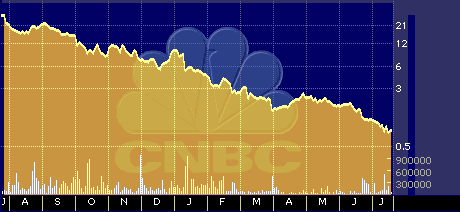
Firepond Post-IPO Stock-Performance Chart
“I’d guess the people that would be most interested in [Firepond] would be the people who tried to get into the Calico IPO and failed,” says Erin Kinikin, an analyst at the Giga Information Group, based in San Jose, Calif. The two companies are very comparable. Calico has a lot of buzz right now, and there’s nothing wrong about cruising behind someone else’s slipstream.”
Like Firepond, San Jose, Calif.-based Calico Commerce Inc.’s {CLIC} core products help e-commerce Web sites offer personalized shopping experiences in a variety of ways, such as by suggesting products that meet requirements outlined by customers.
Calico went public on Oct. 6 with shares initially priced at $14. The stock shot up as high as $75 shortly after the IPO, before more recently falling back to roughly three times its offering price.
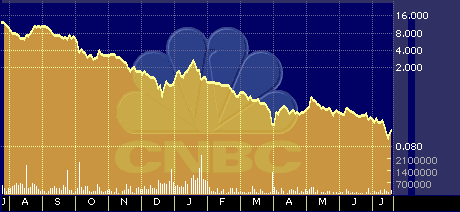
Calico Commerce Post-IPO Stock-Performance Chart
Waltham, Mass.-based Firepond makes similar products, sometimes called configuration managers, that help online customers put together exactly the item they want, which may involve selecting from dozens of feature options. The software examines online selections to make sure the desired products are available, calculates prices and makes certain that customers haven’t picked incompatible components.
“Firepond is getting some traction and will probably do well,” agrees Harley Manning, an analyst at Forrester Research, based in Boston. “There are a small number of configuration players, and Firepond is among them.”
Even so, Kinikin, warns that investors might get burned over the long term if they buy the stocks of smaller, e-commerce enabling companies such as Calico, Firepond, or some of the other highflying relatively new names serving similar online marketing needs, such as eGain Communications Corp. {EGAN}, Kana Communications Inc. {KANA} or Net Perceptions Inc. {NETP}.
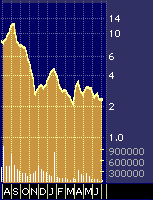
Post-IPO Stock Performances
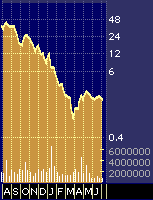
(left to right): eGain Communications,
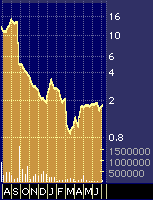
Kana Communications and Net Perceptions
“Markets start out with small players innovating and big players making acquisitions,” Kinikin says. “The safe bet is on the big battleships, the Oracles, the Siebels and the SAPs. The last thing a customer wants is to have to take products from seven different vendors and have to put them together.”
While none of those big-name companies currently offers e-commerce applications that are as good as the best niche players in particular areas, Kinikin says Oracle, SAP, Siebel Systems, and also Cisco Systems Inc. {CSCO}, may be able to more effectively target the most lucrative e-commerce application areas once smaller competitors have more fully demonstrated their worth.
“Siebel is already practically running away with the customer relationship market,” which is an important subset of online e-commerce, Kinikin says. “Oracle, strictly because this is Larry Ellison’s focus right now, and they have the ability to take these products all the way back to their enterprise resource planning (ERP) customers. And SAP, even though they are behind, still has a huge installed ERP base that is going to be hard to dislodge.”
Blaine Mathieu, a former lead Internet analyst at Dataquest, disagrees, saying the best small companies will have an advantage moving forward in the current competitive climate.
“In the old economy, it was easier and cheaper to choose solutions that were ‘good enough’ since integrating best-of-breed technologies was too expensive and risky,” Mathieu says. “Now, integration is rapidly becoming easier as solution providers build hooks into other applications.”
Mathieu says newer technologies, such as XML, are making the flow of data between different software products more transparent.
“It will become even more likely that companies will choose to put together an optimal solution a la carte,” Mathieu says. “Companies no longer have to ‘settle’ for anything. The larger e-business solution providers realize this and are doing their best to catch up.”
Mathieu is so convinced on this point that late last year he left his high-profile job at Dataquest to take over as vice president of strategic planning at AlcheMe Inc., a Silicon Valley start-up that specializes in personalization solutions.
Robert DeSisto, an analyst at the Gartner Group, based in San Jose, Calif., agrees with Kiniken that there is going to be considerable consolidation among e-commerce enabling firms. But he also agrees, at least in part, with Mathieu, saying that at least some of the smaller players have an opportunity to become the acquirers, not the aquirees.
“You go back just a few years ago when Computer Vision Inc. was a $1 billion company and then Parametric Technology {PMTC} comes out of nowhere with better technology and now Parametric, which bought Computer Vision, is the $1 billion company. It happens all the time,” DeSisto says.
In addition, DeSisto says that big companies are more prone to offer “one-size-fits all” products to customers, while smaller niche players are often more responsive to client company needs. He adds that doesn’t mean most of the niche players in the e-commerce enabling market will survive. One or two may grow into giants, he says, others will be acquired, and the remaining firms may have a very tough time surviving.
“We’re going to see a weeding out process over time,” agrees Christopher Hoffman, worldwide director of application solutions services at International Data Corp., based in Framingham, Mass. “But we’re also going to see continued growth for small players willing and able to do innovation and customization. Smaller companies do have the nimbleness to take advantage of rapid innovation.”
Manning says he thinks both Firepond and Calico have a good shot at being long-term winners in their markets, even if those wins do come as a result of merging or being acquired by other firms.
“It’s trivially easy to [write computer] code for auction software or online wallets,” Manning says. “Companies in those markets could have a lot to worry about. But it is much harder to do configuration-management software. Those products have fundamentally valuable technology that is going to be important to the people who acquire them.”
Manning says the movement toward open systems is an even bigger competitive issue than big vs. small. Attention to such concerns, he says, will very quickly be separating winners from losers in the e-commerce enabling market, regardless of company size.’
International Business Machines Corp.’s {IBM} recent announcement that it would use the open standards-based Java software in its WebSphere server product is, Manning says, a case in point.
“It doesn’t really matter how big a company is,” Manning says. “There’s a train coming down the tracks called open standards, and if companies don’t get on it they’ll be run over by it.”
Manning says it isn’t essential that companies use Java, a popular open standard developed by Sun Microsystems Inc. {SUNW}, as long as they rely on some other similar open standardized platform.
E-commerce enabling firms that rely on their own proprietary non-standardized technologies are, Manning says, doomed. “They’re going to get caught up in no man’s land and will dry up and blow away,” he says.
Proprietary systems that can’t be easily integrated with other online e-commerce systems are, Manning adds, the equivalent of dying languages.
Manning cites two widely popular e-commerce infrastructure stocks, BroadVision Inc. {BVSN} and Vignette Corp. {VIGN}, as being particularly at risk.
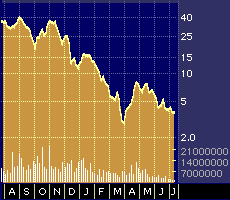
BroadVision 52-Week
Stock-Performance Chart
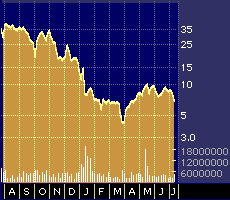
Vignette Ppost-IPO
Stock-Performance Chart
“I’d say in Vignette’s case they understand the threat pretty well and are trying to do what they need to do,” Manning says. “In Broadvision’s case, I’m not so sure.”
Firepond posted a loss of $20.1 million on revenue of $24.3 million for the nine months ended July 31, compared with a loss of $4.3 million on $24.2 million in revenue for the same period a year earlier.


